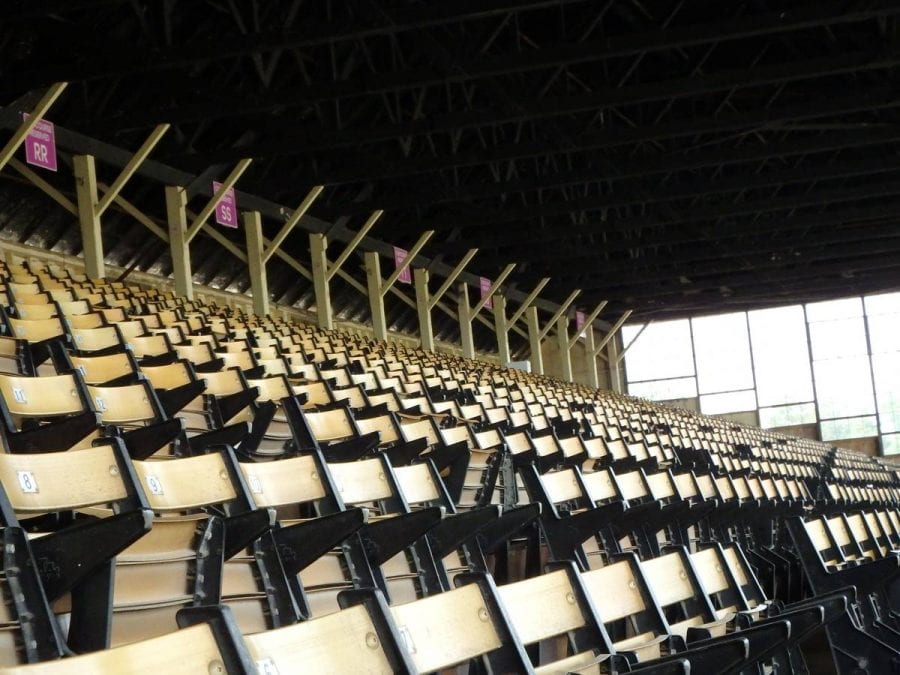Lengthy hearing provides little clarity on Pimlico future

Maryland racing interests said Friday that they did not oppose state legislation to create a group to study ways to fund a new Pimlico – and at the same time reaffirmed their belief that Maryland racing’s future is a Laurel Park “super track.”
The statements came at a hearing of the House Ways and Means Committee in Annapolis that surpassed the six-hour mark before it, mercifully, came to an ending. The hearing covered numerous bills not involving horse racing, as well as several that did.
Primarily at issue were two pieces of legislation. HB 1190/SB 800, introduced at the request of the Baltimore City administration, would create a study group tasked with determining ways to fund a new, $424 million Pimlico based on the proposal developed by the Maryland Stadium Authority late last year.
And HB 990/SB 883 would allow the Maryland Jockey Club (MJC) to work with the state-created Maryland Economic Development Corporation to issue bonds backed by Racetrack Facility Renewal Account (RFRA) funds to undertake major projects at Laurel Park and the Bowie Training Center.
The bill “allows us to roll funds forward in a matching effort to build a ‘super track’ [at Laurel] to attract world championship events like the Breeders’ Cup,” testified Tim Ritvo, chief operating officer of the Stronach Group, which owns the MJC. “The sole intent… is to create an event place that will last the next 50 years.”
In supporting testimony, Maryland Thoroughbred Horsemen’s Association executive director David Richardson pointed to the importance of renovating Bowie, which the MJC has said it wants to turn into a “world-class” training facility that would create stabling space for hundreds of additional horses.
“This legislation will allow us, with the reopening of Bowie, to grow our business and keep moving forward,” Richardson told the panel.
Ritvo said that the company hopes to attract the Breeders’ Cup, which currently is scheduled through 2021, perhaps to be held at Laurel in 2022.
“We must act now, though,” Ritvo said. “Our window of losing the Breeders’ Cup will pass… They’re waiting for a comprehensive plan that we can make by this June.”
The 2017 Breeders’ Cup, a two-day championship event, reportedly had an impact of nearly $97 million on the San Diego region’s economy when the event was held at nearby Del Mar.
Yet if the company was pushing for urgency, not everyone was feeling it.
“This bill, to me, is premature,” Baltimore Mayor Catherine Pugh told the panel.
Instead, she and a well-orchestrated corps of supporters urged the legislature to back the bill creating a workgroup to study ways to finance a new Pimlico.
“Our intent is to get everyone back to the table to determine how we move forward,” Pugh said. She characterized having the Preakness at Pimlico as critical from a historical perspective, as a point of prestige, and as a vital cog in the hoped-for revitalization of the surrounding Park Heights neighborhood.
“It’s not the just the track,” said Barry Glassman, county executive of nearby Harford County. “It’s the jobs, the communities. It is the one great chance to turn those communities around.”
Exactly so, agreed well-known Baltimore attorney Billy Murphy.
“Baltimore is at a critical turning point,” he said. “Property values in the Park Heights area are at a historic low… There is an exodus of residents… Losing Pimlico would accelerate all this bad stuff.”
Horse racing interests said they did not oppose the city’s proposed study group legislation. Indeed, the MTHA’s Richardson, and Cricket Goodall of the Maryland Horse Breeders Association, both encouraged legislators to include representatives of their groups in the proposed study group.
But racing folks also said it should not delay or prevent moving forward on the company’s proposed legislation.
John Favazza, a lobbyist representing the Maryland Jockey Club, told the panel that the two initiatives can “work on parallel tracks,” adding, “Regardless of the decision that Is made on Pimlico and that bill, these upgrades to Laurel are essential to the year-round racing program and to attract these major events like the Breeders’ Cup.”
A handful of legislators pushed back at the MJC position, at times questioning the company’s motives.
“Many people feel that the intention behind this bill is to shut down Pimlico,” asserted Del. Nick Mosby, representing Baltimore City.
But Ritvo disputed that, saying the critical question his company asked was, “What is in the best interest of Maryland racing year-round?”
That, he said, was a “super track” at Laurel and a top-quality training facility at Bowie.
As for Pimlico, his company’s position was equally clear.
“We will not be purchasing or paying in the development of the new track at Pimlico,” he said. “If the state and city finds a system or formula to pay that, build that and be there for two weeks a year, we’re fine with that.”
The House panel did not take action on either of these bills. The Senate companions of both bills are scheduled for hearings in the Senate Budget and Taxation committee on March 6.









The government shouldn’t be funding playgrounds for the trust fund horsey set.